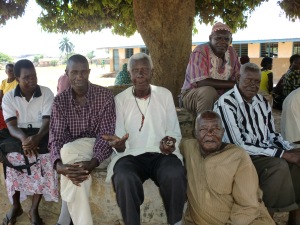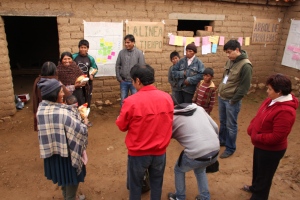Last week I had the opportunity to speak at the President of the UN General Assembly’s High Level Event on human rights and rule of law. I tried to reflect what we’ve learnt through the grassroots research carried out by Participate and the global participatory processes led by Beyond 2015 – ultimately, that people experiencing poverty and marginalisation want the opportunity to meaningfully shape the decisions that affect their lives.
Many member states and panellists have realised that to be fundamentally transformative, the post-2015 development agenda needs to be people-centred. One of the lessons learnt from the MDG experience is that a siloed approach does not work and that development cannot be ‘one size fits all’. If we do not recognise and respond to the diverse contexts and realities in which people live, our interventions are at best ineffective, and at worst harmful. This means that the post-2015 development agenda should be providing goals and targets which facilitate people to direct their own context specific development, not imposing a top down framework. This means reaching out to people where they are and allowing a shift in power dynamics that will have to be reflected in the relationship between the local government official and the grassroots community, the citizen and the state, and here at the international level.
Delivering human rights and rule of law that work for the poorest
But what does this mean in terms of the practical application of a global development framework composed of a specific, limited number of goals, targets and indicators?
The recommendations put forward here are garnered from participatory processes with people experiencing poverty, exclusion and vulnerability, because of factors such as economic status, disability, ethnicity, age, gender, and many more. Applied, they will enable the framework to be people-centred and deliver human rights and rule of law that work for the poorest.
- Prioritise development investment which starts with the needs of the poorest and most marginalised people. As a global community, we have a responsibility to listen to those whose lives are most difficult, and make their interests a priority.
- Give marginalised groups the opportunity to define the rights that matter most to them. Many poor and marginalised groups see rights as a crucial means to achieving equality and dignity. The rights they prioritise reflect the deficits that they feel most keenly in their lives. For some, rights provide a pathway to recognition of their status as human beings and citizens, such as disabled children in Kenya interpreted their invisibility to policymakers as a lack of respect for their rights. For others, rights have a more material dimension; in Ghana, young people prioritised their right to education, food and shelter.
- Protect the rights called for by the poorest and most marginalised within legal frameworks. The concept of rights is central to any attempt to address deep-rooted inequalities. Yet while formal recognition of rights in law is a critical milestone, it does not automatically translate into concrete outcomes. Enshrining rights in law is a crucial first step, but they must be implemented through the transformation of discriminatory norms and values.
- Target institutional discrimination, and ensure that government representatives and officials treat all people with respect. Through research with partners in Uganda, the Philippines, Bolivia and Zimbabwe, CAFOD has seen the power of the MDGs to change and challenge discriminatory social norms representing a considerable improvement for specific groups of people, such as those living with HIV or indigenous peoples.
- Involve citizens in creating, monitoring and implementing the post-2015 development framework. A participatory approach to governance is one which engages with local knowledge, strengthens people’s voices, and enables people to influence decisions and hold decision-makers to account, thereby improving national ownership and accountability. While this approach can benefit many, it must be targeted to ensure they are inclusive of those who are usually excluded so that no one is left behind.
- Ensure that indicators are linked directly to positive impacts for the poorest and most marginalised, and that no progress can be achieved unless it is realised by all relevant social and income groups.
A central desire articulated by people around the world is to be able to play an active role in developing their own futures, and in shaping the policies and programmes that affect them. This needs to be at the heart of the post-2015 framework. People have clearly shown that they want to be part of identifying solutions with policymakers and practitioners. Not only should we be hearing people’s call for the right to participate in decisions that affect them, we should also be recognising that their participation is essential to secure good outcomes and effective implementation of the post-2015 agenda.
Human rights as a pathway to development
As one Participate research participant from Brazil commented, ‘The counterpoint to this [my poverty] is dignity. It should be a compass to show us the way. I have the right to dignity.’
Building effective, accountable, and legitimate institutions is not just an issue for conflict countries but for all countries. This needs to be a universal approach. Effective and resilient societies and state institutions build trust between the state and the population. As this is a universal framework, it will be as relevant to me and my communities in the UK as it will be to those of our partners around the world. I want a government that is open, accessible and inclusive to enable me to trust and participate in my country’s development progress.
This is about the development aspects of peace – the social, political and economic inclusion of people, ending injustice and discrimination and building resilient societies and institutions. Human security is prioritised by people who are poor and marginalised, as even small-scale disasters and conflicts have the potential to destroy years of progress and undermine the wellbeing of people for years to come.
This builds on the mandate from Rio+20 for the post-2015 development agenda, where the ‘Future We Want’ acknowledged the centrality of democracy, good governance, and human rights. The post-2015 development agenda can be transformative by making people the artisans of their own destinies through enabling them to participate every step of the way, from design and implementation, to monitoring and accountability of our global commitment to end poverty through sustainable development.
Tags: post-2015, President of the General Assembly, UN, United Nations




Leave a comment